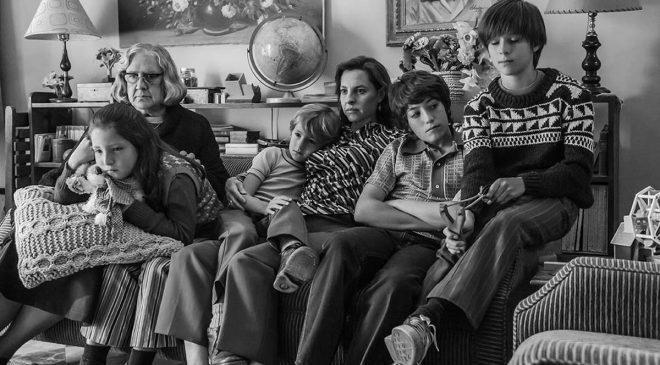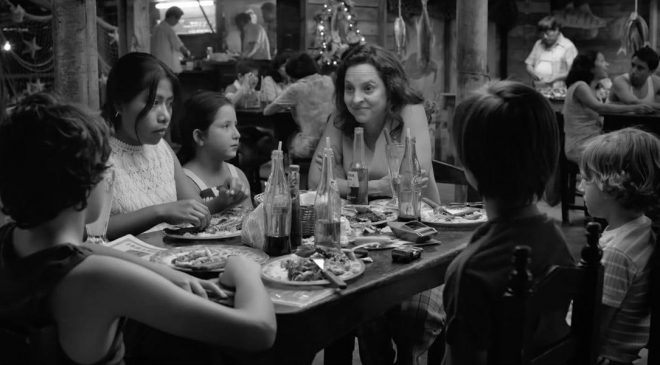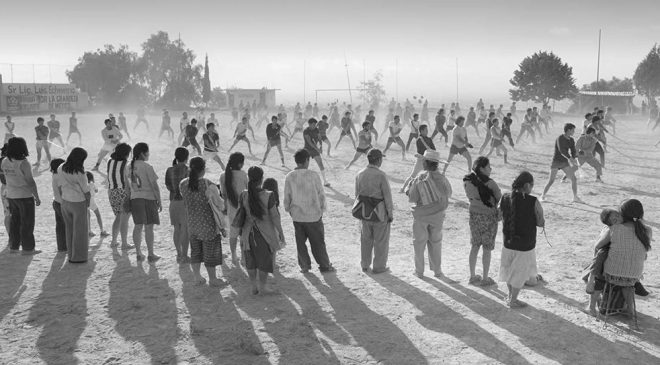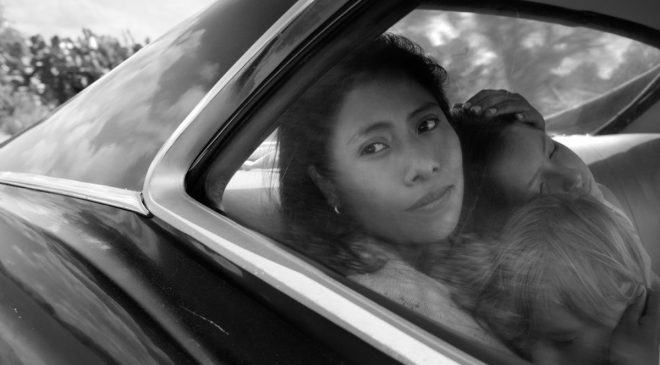Movie Review – Roma

Principal Cast : Yalitza Aparicio, Marina de Taviri, Fernando Grediaga, Jorge Antonio Guerrero, Marco Graf, Daniela Demesa, Diego Cortina, Carlos Peralta, Nancy Garcia, Veronica Garcia, Jose Manuel Guerrero Mendoza.
Synopsis: A story that chronicles a year in the life of a middle-class family’s maid in Mexico City in the early 1970s.
******
It’s been five long years between films for director Alfonso Cuaron, the man behind such cult favourites as Children of Men, Y Tu Mama Tambien, the mid-90’s Great Expectations remake (which I hated) and 2013’s space-borne Gravity. The arrival of Roma, the director’s tone poem to his Mexican childhood and semi-autobiographical drama, was lauded and heralded as it landed on Netflix to considerable acclaim – the platform afforded the film a cinematic release to qualify for the Academy Awards, which says something about their hopes for the movie – and to a degree I agree with the clamour of praise for his latest effort. I, however, was not as moved as some by its placid storytelling style and glacially paced intimacy, nor was I as entranced with Cuaron’s infatuation with slow pans and tracking shots as his modus operandii, something that worked in the vacuum of Gravity’s orbital shenanigans but feels too stately to accommodate the introspective weight of Roma’s sun-bleached decals.

Set in 1971, Roma tells of live-in housemaid Cleo (non-actor Yalitza Aparicio) and the family she serves in the suburb of Colonia Roma, Mexico City. Cleo works for Sophia (Marina de Tavira), the wife of an absentee husband, Doctor Antonio (Fernando Grediaga) and her multiple children, as well as Sophia’s mother Teresa (Veronica Garcia) and another maid, Adela (Nancy Garcia). Through the film, Cleo tends to the children as Sophia’s marriage falls apart, while the city is beset with student protests (turns out, the event is the historic Corpus Christie Massacre) and Cleo’s own unintended pregnancy has consequences for her life in the city.

Roma sets itself as a prestige film from the get-go. Ostensibly highbrow, the film’s crisp monochrome cinematography and impeccable technical credentials make it a shoe-in for Hollywood love at awards season. Cuaron, an auteur who not only writes and directs, but also shoots and edits the film himself, is obviously in love with the subject matter, it being so close to his heart, and the film’s loving embrace of its place and period is obviously designed to showcase the director’s homeland at a time in history when Mexico isn’t particularly valued by American audiences. The story dwells on the relationship between Cleo and the family she works for, the tension between them as Sophia’s marriage collapses, and Cleo’s own insemination at the hands of practising martial artist Fermin (Jorge Antonio Guerrero, revealing far more of himself in this film than I ever needed to see). It’s a slow story to unravel, and Cuaron’s script is grounded in a realism and lack of ostentation that makes for intimate and often uncomfortable viewing. Truly, the director’s eye for detail is exacting, the film’s Fincher-like gaze and Cuaron’s unflinching camerawork as precise and mature as that we glimpsed in Children Of Men – keynote, the director once more gives us a heartbreaking birthing sequence, and even cleverly acknowledges the his own work in Gravity at one point – but it’s this attention to detail that neuters a lot of the story’s heart and soul.

Loathe as I am for comparisons between directors, but Cuaron’s Roma seems to mix the style of Kubrick, Terence Malick and even a touch of Ingmar Bergman. It’s stateliness exhibits grand purpose without actually delivering a grand story. At the end of it, Cleo’s arc, her motivation within the film and her reason to even exist on the screen, lack any sense of urgency that warrants a two-hour movie. The propelling juxtaposition of Sophie’s marriage breakdown isn’t managed well enough to make Cleo’s fate all that important, she’s just… there. Perhaps Cuaron is intending us to approach the film as an Everyman journey, Cleo representing any of us at this kind of crossroad in our lives, but I’m unsure and it didn’t work for me. The film feels overburdened with clever wide-shots and deliberately paced panning shots (seriously, everything is either pan right or pan left and back again) to concentrate on the characters’ plights.

The decision to cast Yalitza Aparicio in the lead role is both understandable and inexplicable. On the one hand, having somebody who has never acted before shoulder your big-budget period production is a risk that could pay off if the film is really, really good. On the other, the film’s central weakness could very well be the lead actress’ intractable woodenness, a factor that undermined a lot of Roma’s great work for me. The character – and by extension Aparicio herself – is one in which she tends to be a passive observer in the story, rather than an active participant (heck, even the “sex scene” in the film involves the man far moreso than the actress herself) and this distance between character and events is echoed in the film’s ambivalence. In short, the story, characters and most of the plot held little interest for me, and aside from viewing the film as a technical exercise of precision, Roma was actually rather boring.

I’m not suggesting that Roma isn’t a good film, if you’re into this kind of thing. It is a beautifully shot, cleverly designed and arguably masterful portrait of a time in Mexico’s history that people ought to look deeper into, and there are moments in the film where it really does tug on the heartstrings and stir up emotions. But I found it a frustratingly opaque film of isolation (perhaps notated primarily by the constant motif of escaping jetliners in the sky) that I couldn’t involve myself within, as much as I wanted to. I could feel Cuaron’s love for the subject trying to dig its fingers into me, drag me into the film’s lustre, but it never worked for me. Call me a savage or a contrarian, sure, but each to their own. This time, Cuaron’s visual poetry doesn’t activate the part of my brain that made me enjoy his latest movie. Roma is merely humdrum, and just a touch pretentious.

